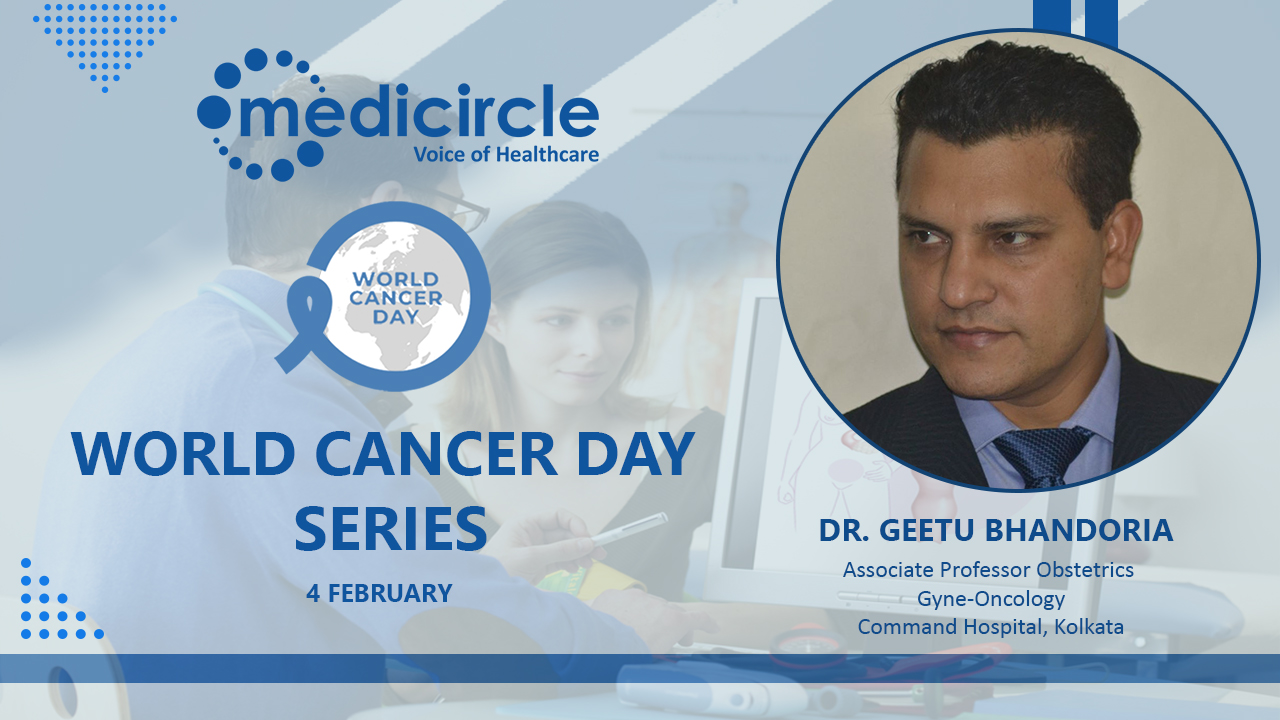More than 10 million people around the world die each year from cancer. Experts project that cancer cases would rise to 13 million by 2030. At Medicircle, we are conducting an exclusive interview series with eminent oncologists to bring awareness about cancer, its treatment, and myths related to it.
Dr. Geetu Bhandoria is an associate professor of obstetrics and gyne-oncology at Command Hospital in Kolkata and has been in the medical profession for the past 19 years. He is an administrative fellow and member of Jr. Editorial Board at the International Journal of Gynecological Cancer (IJGC).
60-70% of cancer patients live up to five years or beyond post-diagnosis
Dr. Bhandoria infuses positivity by informing that “as soon as one is diagnosed with cancer, it seems to the patient that it is a death warrant. However, due to advancements in treatment options, most of the patients actually live for quite a long time. Almost 60 to 70% of cancer patients today live up to five years or beyond.”
Not the number of cancer cases rather the ratio of diagnosis has increased
Dr. Bhandoria provides yet another positive insight by emphasizing that, “it’s not that number of cancer cases are increasing day-by-day. It’s just that our overall diagnostic and health-care facilities have improved drastically over the course of several decades due to which there is an increase in the number of diagnosed cases. We have good diagnostic facilities now, even in smaller towns, and availability of ultrasound, CT scans, etc. There is easier access from rural areas to the bigger healthcare setups, so maybe that is why more patients are being diagnosed now. These numbers indicate as if overall cancer incidence could be increasing,” says Dr. Bhandoria
We ignore gynecological symptoms globally
Dr. Bhandoria points out that people tend to ignore little symptoms in the earlier stages of cancer when it is curable. He emphasizes that those symptoms are so non-specific that people tend to ignore it. By the time we pay attention, its already at an advanced stage. This happens with people irrespective of nationality. However, India has the highest number of cervical cancer cases.
Awareness campaigns would ensure a better future
Dr. Bhandoria presses on the need for a higher number of awareness campaigns. Since our country leads the number of cervical cancer cases, women should not take normal vaginal discharge or abnormal bleeding lightly. These are early warning signs which can lead to a complete cancer cure if tended on time.
(Edited by Amrita Priya)

 “There has been advanced diagnostic and healthcare facilities in recent times. All we require is increased awareness amongst people so that they do not ignore their early signs and start treatment at the curable stage itself,†observes Dr. Geetu Bhandoria, Associate Professor of Obstetrics and Gynae Oncology at Command Hospital, Kolkata.
“There has been advanced diagnostic and healthcare facilities in recent times. All we require is increased awareness amongst people so that they do not ignore their early signs and start treatment at the curable stage itself,†observes Dr. Geetu Bhandoria, Associate Professor of Obstetrics and Gynae Oncology at Command Hospital, Kolkata.









.jpeg)


.jpg)






.jpeg)

.jpg)




.jpg)




.png)

